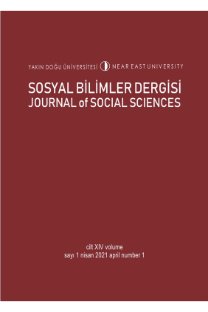Ideological process of shopping malls within the framework of ‘glocalization’
Kent yaşamının anlamının değişmesiyle birlikte şehirler tüketim olgusunun ana merkezleri haline gelirken, alışveriş merkezleri de modern şehirlerin önemli işaretlerinden biri haline geldi. Kentleşme sürecindeki küresel eğilimler alışveriş merkezlerini kent deneyiminin merkezi durumuna getirdi. Fiziksel özelliklerinin avantajlarını da kullanarak alışveriş merkezleri kent içerisinde stratejik noktalara konumlandırılıp tüketicilerin dikkatini çekerek, onları baştan çıkarmak üzere tasarlanmışlardır. Bu çalışmanın amacı, kapitalizmin yapısal değişikliklerine vurgu yaparak, alışveriş merkezleri sure geldiği varsayılan ideolojik süreci değerlendirmektir. Bunun yanı sıra, bu çalışma, alışveriş merkezlerinin küresel ve homojen yapısının nasıl fordizm sonrası kapitalist söylemi daha yerel, politik ve sosyal etkilerle bir araya getiren ‘glokalleşme’ sürecine doğru yol aldığını sorgular. Bu çerçevede, kapitalist toplumlardaki hakim ideoloji tezinin sınırlılıkları küreselleşme teması etrafında incelenme ve analiz edilme fırsatı bulur. Bu analiz için NicholasAbercrombie’nin “Popular CultureandIdeologicalEffects” [Popüler Kültür ve İdeolojik Etkiler] adlı makalesi ve hâkim ideoloji eleştirileri temel kaynak olarak kullanılacaktır.
‘Glokalleşme’ çerçevesinde alışveriş merkezlerinin ideolojik süreci
ith the changing meanings of urban lifestyles, cities started to be seen as the main landscapes of consumption and shopping malls became one of the markers of the modern cities. Global trends in urbanization turned shopping malls into the core of the urban experience. With their advantageous physical features, these spaces are strategically located and designed to attract attention and seduce consumer groups. The goal of this critical study is the assessment of ideological process that is assumed to be going on in shopping malls by emphasizing the structural changes of capitalism and questioning how global and homogeneous structure of shopping malls moves towards a process of ‘glocalization’ that combine the post-fordist capitalist logic with more local, political, cultural and social influences. Within this framework, the limitations of dominant ideology thesis in capitalist societies are analyzed around the theme of globalization. For the analysis, Nicholas Abercrombie’s “Popular Culture and Ideological Effects” article and the critiques in the article about the dominant ideology thesis are used as the major references.
___
- ISSN: 1986-1303
- Yayın Aralığı: Yılda 2 Sayı
- Başlangıç: 2008
- Yayıncı: Yakın Doğu Üniversitesi
Sayıdaki Diğer Makaleler
Köy enstitüsü mezunlarının halkçılık anlayşının eleştirel bir incelemesi
Doğu-batı söylemleri çerçevesinde Türkiye – Avrupa/avrupa birliği algıla(mala)rı
Ideological process of shopping malls within the framework of ‘glocalization’
State capitalism and Russia’s energy policy in northeast Asia
The position of grivas in Us’ Cyprus policy
Toplamsal ifadeler içeren problemlerin çözümündeki tersine çevirme prensibi uygulamaları
The development of nationalism in india
State centric Russian energy policy and rapprochement in russia-Turkey relations
